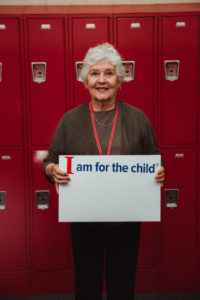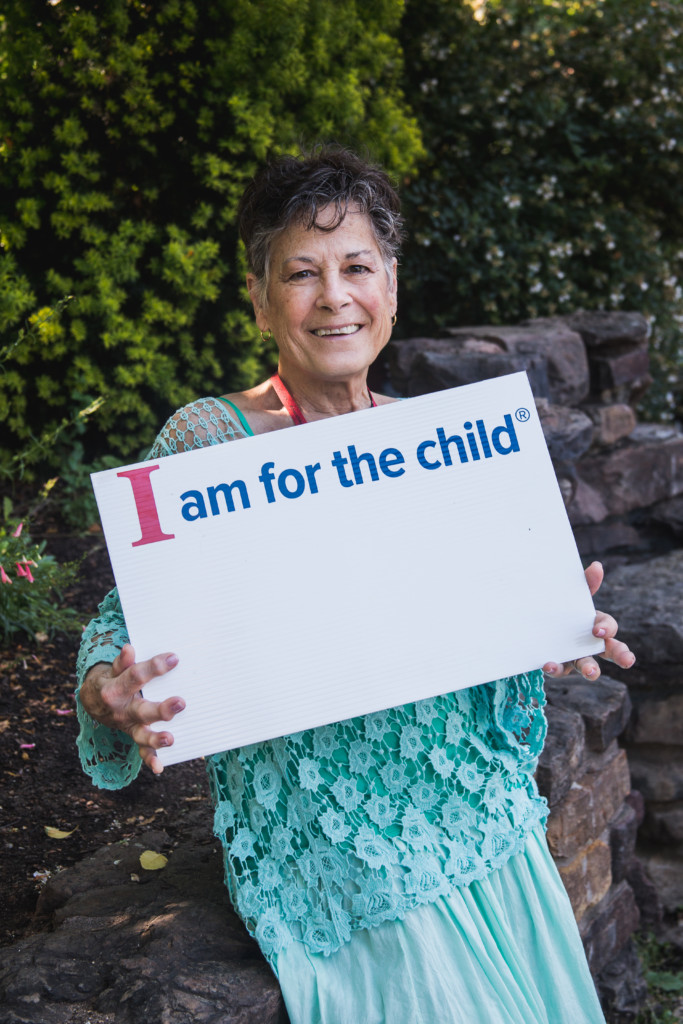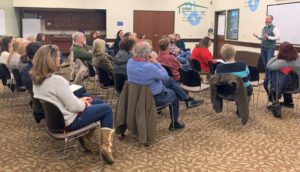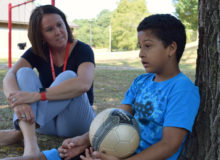Asked & Answered: Does an advocate work with a single child?
 Answered by Advocate Supervisor Abra Morgan, LSW
Answered by Advocate Supervisor Abra Morgan, LSW
Is there a question we haven’t covered that you’re wondering about? Email info@nwacasa.org!
Asked & Answered: Can You Work a Full-Time Job while Performing CASA Duties?
Absolutely! Many of our volunteers have full-time jobs and families. Most of the CASA’s duties are carried out on their own time. Such tasks may include conducting independent research, reviewing relevant documents, visiting/interviewing biological and foster families, and of course, visiting the children in their placements. With that said, there may be some challenges regarding scheduling. We often have to work around the schedules of others since we are asking to enter their homes — and as of this last year, their screens! Foster families tend to be busy people!
 There are certain necessary CASA commitments that take place during regular business hours, such as case meetings or court hearings. Court hearings typically occur 3 to 4 times a year and are scheduled months in advance. We encourage potential volunteers to have a conversation with their employers about taking time off for these appointments. We generally find that employers are willing to be flexible, particularly for such a good cause. If a volunteer must miss one of these important meetings, their CASA staff supervisor will participate and communicate on their behalf, later providing the volunteer with a summary of what they missed.
There are certain necessary CASA commitments that take place during regular business hours, such as case meetings or court hearings. Court hearings typically occur 3 to 4 times a year and are scheduled months in advance. We encourage potential volunteers to have a conversation with their employers about taking time off for these appointments. We generally find that employers are willing to be flexible, particularly for such a good cause. If a volunteer must miss one of these important meetings, their CASA staff supervisor will participate and communicate on their behalf, later providing the volunteer with a summary of what they missed.
The time commitment of a CASA volunteer is definitely something to consider, but it is often the case that people are able to balance the workload and schedule accordingly with sufficient notice.
Answered by Advocate Supervisor Statler Kramer
Volunteer Spotlight: Kristi & Jeff Blaschke
High school sweethearts. Arkansas alumni. Accountants. Parents.
In 2016, Kristi and Jeff added CASA advocates to their titles and accomplishments.
At that time, Kristi and Jeff were balancing successful, full-time careers and three beautiful children. To an outsider, their lives probably looked complete. But, something was pulling at Jeff’s heart. He realized that not every child had the opportunity to grow up in a family like his, and he felt a real desire to give back. While the Blaschkes had considered fostering, their lives never seemed to be in a place where they could make that commitment. Having known several CASA advocates, they knew it was a great opportunity to serve this community of children in a meaningful way. It was a real benefit that they could share this experience together, as they have the rest of their lives.
It’s been five years since that journey began. While intimidated a bit at first, they have leaned on their training, their CASA supervisor, and each other to be what these children need during this difficult time. They make a great tag team. Jeff can keep the kids occupied while Kristi interviews parents. If work prevents one of them from visiting the children, the other one is there as back-up. They can divvy up calls, court reports, and staffings – just like they would for their own children’s extra-curriculars or doctors’ appointments.
 It’s not always been easy. They’ve been surprised by how drawn out this process is for children and earnestly wish that these innocent kids didn’t have to face these circumstances. But, the days they’ve witnessed adoptions or heard how one of their CASA kids continues to excel in school despite her trauma…well, they know their time and energy has been worth it. And through the good and bad, they are there for each other.
It’s not always been easy. They’ve been surprised by how drawn out this process is for children and earnestly wish that these innocent kids didn’t have to face these circumstances. But, the days they’ve witnessed adoptions or heard how one of their CASA kids continues to excel in school despite her trauma…well, they know their time and energy has been worth it. And through the good and bad, they are there for each other.
We are indebted to the Blaschkes for their years of impact. If you too feel called to serve, we strongly encourage you to join us for a CASA 101 info session. See the upcoming dates and times here.
Asked & Answered: What is a CASA volunteer’s role in family finding?
Arkansas law is clear that the preferred placement for a child in foster care is with relatives. Studies show that children who are placed with family (instead of traditional foster homes) are more likely to be placed with siblings and achieve better outcomes overall.
To assist with family relationships and placement, the law states that CASA volunteers should provide the court with information about a child’s adult relatives including recommendations for relative placement and visitation.
Before they can share this information with the judge, our volunteers must first execute the very important work of identifying and contacting relatives and fictive kin of children in care to determine their willingness to be involved in the case. Utilizing a variety of search methods from file mining to scouring social media platforms and public records, as well as interviewing currently known relatives, advocates will begin to flesh out the family tree and make important connections for their CASA child. Beyond placement opportunities, simply being connected to one’s family can provide a child in foster care with a critical sense of identity.
In order to fulfill our duties to the court and build a network of supportive and caring adults for the children we serve, we provide regular training to our volunteers, new and seasoned, in family finding methods and techniques.
 Answered by Training Manager Ryan Brashears
Answered by Training Manager Ryan Brashears
Asked & Answered: Is a legal background required to be a CASA volunteer?
 Absolutely not! Most of our 410 advocates have no formal legal training whatsoever. We often get asked, “Who makes the best advocate?” This is such a hard question to answer. Is it a therapist, lawyer, nurse, retired teacher? While people with these backgrounds are often fantastic advocates, we find that a person with a heart for children is the best place to start. People who are willing to be open-minded, flexible, and committed are the very best advocates we have. You must be able to have hope and the belief that people can change their lives for the better. So, there is no need for you to go to law school! We promise to give you all the tools you need to navigate the court system, and we will be with you every step of the way.
Absolutely not! Most of our 410 advocates have no formal legal training whatsoever. We often get asked, “Who makes the best advocate?” This is such a hard question to answer. Is it a therapist, lawyer, nurse, retired teacher? While people with these backgrounds are often fantastic advocates, we find that a person with a heart for children is the best place to start. People who are willing to be open-minded, flexible, and committed are the very best advocates we have. You must be able to have hope and the belief that people can change their lives for the better. So, there is no need for you to go to law school! We promise to give you all the tools you need to navigate the court system, and we will be with you every step of the way.
 Answered by Program Director Shelley Hart
Answered by Program Director Shelley Hart
Skilled CASA Champions
 Every child in foster care will have a fierce and skilled CASA champion by their side. That’s our vision. But what does it take to support a community volunteer on their journey to becoming skilled?
Every child in foster care will have a fierce and skilled CASA champion by their side. That’s our vision. But what does it take to support a community volunteer on their journey to becoming skilled?
To start, every CASA volunteer completes 30 hours of preservice training. This National CASA training, provided by our very own Ryan Brashears and Tara Marcom, offers an incredible overview of foster care, the systemic issues surrounding abuse and neglect, court report writing, and powerful case studies. Following the completion of training, each advocate is assigned a staff supervisor who provides additional, case-specific, on-the-job training.
The more knowledgeable our volunteers are about available services and resources, the struggles parents face, and the health conditions commonly seen in children, the more powerful their advocacy will be. That’s why after their first year of service, each volunteer must also complete 12 hours of continuing education per year. 
Because there are so many facets to the world of child welfare, we often collaborate with people from other agencies and organizations who are experts in their field and willing to share their knowledge with our volunteers. Here are a few of our partners who graciously offered their time to educate our volunteers this past year:
“Autism Spectrum Disorder” – Dr. Aleza Green (She’s also a CASA volunteer!)
Tour of the Teen Action and Support Center – Jacqueline Perez, TASC
“Hispanic and Latinx Culture” – Diana Gonzalez, One Community
“Hidden in Plain Sight” – Caren Cox and Kat Pavon, Our Healthy Communities
“Drug Trends in NWA” – Detective Tyler Moore, Fayetteville Police Department
“Fetal Alcohol Spectrum Disorder” – Tamara Keech, Arkansas None for Nine
“Illuminating the Darkness of Sexual Exploitation” – Gretchen Smeltzer and Christy Williams, Into the Light
“The Court Timeline” – Tammy Mullins, Arkansas Office of the Courts
Tour of the Northwest Arkansas Children’s Shelter and Hope Academy – Jake Gibbs, NWACS
“Adoptions” – Daniela Salamo, Benton County DHS
“Recognizing, Reporting, and Preventing Child Maltreatment” – Casey Atwood, Children’s Safety Center
We’d like to thank these individuals and organizations for empowering our volunteers to be the best advocates they can be for children in foster care!
Serving Every Child
Five years ago, CASA of Northwest Arkansas set a very important goal: to provide a CASA to every child in need by the year 2020. We coined this goal our 2020 vision, and this year we achieved it! Between July 2019 and June 2020, we were a voice for every child in need across our four county region! We are so grateful for YOU – our remarkable volunteers, supporters, and partners who made this achievement possible.
Here’s a short Q&A with our Executive Director, Crystal Vickmark, about the journey.
What led to the creation of the 2020 vision?
In 2015, the board of directors challenged us to make our dream a reality. We had been saying we were going to serve 100% of the kids for years, but they wanted to see how we planned to do it. Challenge accepted!
At that time, what percentage of children was CASA of Northwest Arkansas serving?
At the time, we were serving 63% of the children in foster care. We knew we had to grow by 10% (or more) each year to meet the growth of our community and children entering the foster care system.
Why is it important that every child in foster care has a CASA volunteer?
There are so many reasons why a CASA volunteer is essential to a child, but the primary reason is that our children need a voice. They deserve to have someone whose only mission is the ensure that their needs are being met and best interests are heard. That someone is a CASA.
How did you plan to meet this ambitious goal?
After pulling together data and statistics on how many children we anticipated would be in care by 2020, we were able to determine how many volunteers we would need to retain, recruit, and train. We also had to determine our ideal volunteer supervision and staffing levels. We have a 30:1 volunteer to staff member ratio and as the number of volunteers increased, we needed to add more program staff which meant we needed to raise more funds! We had every step laid out for five years and religiously reviewed and modified our plans as we went.
Now that the 2020 vision has been met, what’s next?
 Anticipating that we would meet our 2020 goal, we created a concurrent goal of ensuring our volunteers are highly trained to fiercely advocate for children in foster care. We have highly trained and specialized staff who are providing support and training to our amazing volunteers. Serving every child in need in 2020 doesn’t mean more children will not enter the foster care system, nor will we stop recruiting and training new volunteers! We have two new volunteer training classes starting in August and several more scheduled after that.
Anticipating that we would meet our 2020 goal, we created a concurrent goal of ensuring our volunteers are highly trained to fiercely advocate for children in foster care. We have highly trained and specialized staff who are providing support and training to our amazing volunteers. Serving every child in need in 2020 doesn’t mean more children will not enter the foster care system, nor will we stop recruiting and training new volunteers! We have two new volunteer training classes starting in August and several more scheduled after that.
As Crystal said, our job is far from over. Unfortunately, children continue to come into care every day. While we celebrate this achievement, our eyes are always on the future and the possible challenges to come.
2020 Graduates: Looking to the Future
For many teenagers, graduating from high school is a given. It’s an important step before they head to college or start working. For teenagers in foster care, however, high school graduation is a question mark on a long list of questions they have about their future. The sad truth is that only about 50% of teens in foster care will graduate high school or earn their GED.¹
 Despite the hardships they’ve faced, 9 CASA teens overcame the odds and earned their diplomas or GED this year! One inspiring young woman even graduated a year early while being a single mom. CASA Older Youth Specialist Amanda Wilkerson shared, “I think these teens are all so impressive. Most of them came into care later in their lives and attended multiple schools. They’ve had to overcome a lot of hurdles.” Thanks to the support of their CASA volunteers and foster families, each of these young people is on their way to living the life they want to lead. Three of the graduates plan to attend community college or technical college in the fall. The graduate mentioned above intends to join the military. Others will be heading into the workforce.
Despite the hardships they’ve faced, 9 CASA teens overcame the odds and earned their diplomas or GED this year! One inspiring young woman even graduated a year early while being a single mom. CASA Older Youth Specialist Amanda Wilkerson shared, “I think these teens are all so impressive. Most of them came into care later in their lives and attended multiple schools. They’ve had to overcome a lot of hurdles.” Thanks to the support of their CASA volunteers and foster families, each of these young people is on their way to living the life they want to lead. Three of the graduates plan to attend community college or technical college in the fall. The graduate mentioned above intends to join the military. Others will be heading into the workforce.
Volunteer Scott Manamon’s CASA teen plans to attend a technical college with his sights set on becoming a diesel mechanic. Scott says he’s very proud of what his teen has accomplished; “he’s very resilient despite his situation and wants to be his best in every situation.”
Resilient is the perfect word to describe these teens. They refuse to let the past define them and are looking to the future with hope in their hearts.
A special thanks to our advocates of older youth and to our generous grant partners who make this work possible:

¹Fostering Success in Education: National Factsheet on the Educational Outcomes of Children in Foster Care (2014) https://cdn.fc2success.org/wp-content/uploads/2012/05/National-Fact-Sheet-on-the-Educational-Outcomes-of-Children-in-Foster-Care-Jan-2014.pdf
Asked & Answered: What is the primary goal of a foster care case?
The goal of a foster care case is set by the court, specifically the presiding juvenile judge. With very few exceptions, reunification of children and parents is the initial goal. Reunification means that the parents will work toward fixing the situation that brought the kids into foster care so that the children can be safely returned home. Parents will be given a case plan with things to complete such as drug treatment, counseling, parenting classes, etc. These services are provided by the Department of Human Services to help the parents become stable caregivers for their children. The case plan is not just a checklist; parents must be able to implement the skills they have learned.
Reunification is an important goal because children love their parents and want to be with their family of origin. As a society, there is real value in rehabilitating parents and stopping the cycle of drug abuse, physical abuse, etc. However, the most crucial consideration is the best interest and safety of the children. When children cannot safely return home, it is the intent for them to find a new permanent home with extended family or adoptive parents.
 Answered by Team Lead & Advocate Supervisor Victoria Boyd
Answered by Team Lead & Advocate Supervisor Victoria Boyd